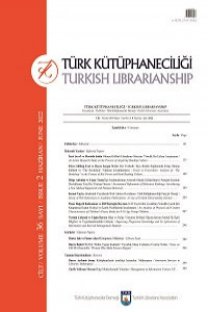International Association of Technological University Libraries (IATUL): Promoting Science and Technology Librarianship in the Changing Library Landscape
International Association of Technological University Libraries (IATUL): Promoting Science and Technology Librarianship in the Changing Library Landscape
International Association of Technological University Libraries (IATUL) has been in the forefront of providing leadership to information professionals and promoting science and Technology librarianship in today's changing library landscape. The present article is an attempt to comprehend the present status of IATUL and analyze the activities and contribution it has made to overcome the range of challenges facing by tertiary level Technological libraries throughout the world. The SWOT analysis method is used to assess the achievements of IATUL, failures and ascertain constraints being faced in this internet age. The author relied on web sites as well as ephemeral material such as minutes, annual reports, newsletters, and memoranda to construct this article. Meeting and Interview with IATUL present and past presidents and other office bearers of the associations provided useful sources of information. It is also attempted to provide relevant information for those interested to join IATUL for professional development.
___
- Bhatt J & Ghosh, M. (2005) . The International association of Technological Libraries (IATUL)2005 Meeting. Library High Tech News, 22 (8), 24-28
- Byrne, A. et al. (2006). IFLA 2005: Report of Achievements. IFLA Journal, 32 (1), 62-63
- Fjallbrant, N (2003). International Association of Technological University Libraries In: Encyclopedia of Library and Information Science ( 2nd ed.) Drake, M A.(ed.) Marcel Dekker, Inc.: New York, :1402-1404.
- Ghosh, M. (2006). The emerging role of national and regional associations in library development: An Indian perspective. Library review, 55 (1&2), 45-58
- Glasgow, E. (2000). The origins of the library association. Library Review, 49 (6), 299-302.
- Gold, J. R. H. & Smith, V. (2002). The future of the professions: are they up forit?, Foresight, 4 (2), 46-53.
- Heather M. (2004). Professional Library & Information Associations Should Rise to the Challenge of Promoting Open Access and Lead by Example. Library Hi Tech News, 21 (4), 8-10
- Homan, M. & McGowan, J. J. (2002). The Medical Library Association: pro moting new roles for health information professionals. Journal of Medical Library Association, 90 (1), 80-85.
- Hyams, E. (2002), US radical takes ALA helm, Library and Information Update, Vol. 1 No. 4, pp. 44-5.
- Janice R. L. (2006). Learning, community give library and information associa tions a bright future. Library Management, 27(1/2), 6 - 13
- Jim Agee & Linda L. (2005). A global view of library associations for students and new librarians, New Library World, 106(11/12), 541 - 555
- Kawooya, Dick. (2001). Management prospects and challenges of library associ ations in Africa: The case for Uganda library association and the library and information association of South Africa. World Libraries, 11 (1& 2), 39-55
- Kunaka, Driden. 1998. Public relations programs for library Associations [Online].
- Available: _____ http://www.ifla.org/IV/ifla64/127-75e.htm > (September 15, 2005)
- Heijne, M. (2007). Stockholm: IATUL's place to be! IATUL 2007 conference program booklet Royal Institute of Technology, Stockholm, Sweden.
- Parent, R.H. (1988). Strategic Planning for Library Associations. IFLA journal, 14 (4), 343-53.
- Shimmon, R. (2003). International Federation of Library Associations and Institutions In Encyclopedia of Library and Information Science, (2nd ed.,) Drake, M. A (ed.) New York: Marcel Dekker, 1408-1417
- Simmonds, P. (2003) Continuing professional development and workplace learn ing 2: CPD and you- How CILIP is meeting the continuing professional development needs of its members. Library Management, 24(3), 169-170
- Smith K. & Harvey R. (2006) Is there a role for professional associations in fos tering research? Proceedings of the Asia- Pacific conference on library and Information Education & Practice 2006, Khoo, C et.al. (ed.) Singapore: Nanyang Technological University, 612- 619.
- Stephen M. (2003). Issues in library associations in eastern, central and south ern Africa: The case of Botswana Library Association (BLA). The electronic library 21(4), 335-351
- Sullivan, P. (1976). Library Associations, Library Trends. 25(1),135-52 Talbot, M. (1998). The Library Association of Australia: a centenary assess ment. The Australian Library Journal, November, 367-383
- Wilson, Aubrey. (1997). Marketing professional associations. Management decision 35(1), 49-52
- Başlangıç: 1952
- Yayıncı: Türk Kütüphaneciler Derneği
